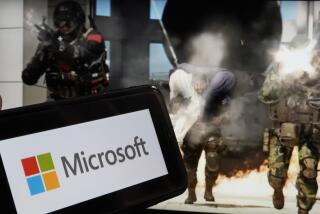Judge in Microsoft Case Reacts to AOL Purchase
- Share via
WASHINGTON — The judge who will decide the Microsoft antitrust case acknowledged Wednesday in surprisingly candid remarks that the pending $4-billion purchase of Netscape Communications by America Online “might be a very significant change of the playing field.”
On the last day of the trial before a holiday recess, U.S. District Judge Thomas Penfield Jackson agreed to allow Microsoft to review paperwork that Netscape and AOL submitted to the Justice Department last week seeking approval of their $4-billion deal.
Saying the purchase of Netscape “could very well have an immediate effect on the market,” Jackson said he might also permit Microsoft to ask the companies for additional confidential documents to help defend itself against the government’s antitrust charges.
AOL spokesman Jim Whitney would not say whether the company will fight Microsoft’s efforts to review its merger documents.
Minutes after the judge’s comments, Microsoft shares climbed $4.50 to a record high of $135.13, before closing at $133.75 on Nasdaq.
Separately, Microsoft said after the close of trading that it will appeal a preliminary injunction blocking it from shipping products that are incompatible with Sun Microsystems Inc.’s copyrighted Java software.
The antitrust trial resumes Jan. 4.
The judge also agreed Wednesday to accept into evidence, all at once, portions of the videotaped testimony of Microsoft Chairman Bill Gates and other industry executives. The government had been playing the video excerpts occasionally in court, part of the reason for the trial’s length. The case initially was expected to last four to six weeks but already is nine weeks long, not half over.
Microsoft lawyer John Warden described the judge’s ruling on the AOL-Netscape documents as “a constructive first step.” But Warden also cautioned that the judge “forecasted nothing of his view of the meaning of the transaction, only that he recognized the obvious fact that it’s of some consequence.”
As part of its antitrust case, the government contends that Microsoft used predatory business tactics to try to “crush” Netscape, whose Internet software once dominated Microsoft’s but now commands less than half of the market.






